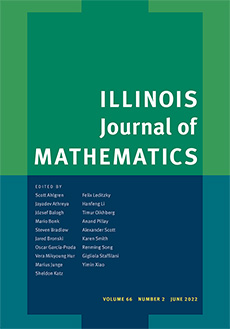Abstract
A quasi-complete intersection (q.c.i.) ideal of a local ring is an ideal with “free exterior Koszul homology”; the definition can also be understood in terms of vanishing of André-Quillen homology functors. Principal q.c.i. ideals are well understood, but few constructions are known to produce q.c.i. ideals of grade zero that are not principal. This paper examines the structure of q.c.i. ideals. We exhibit conditions on a ring $R$ which guarantee that every q.c.i. ideal of $R$ is principal. On the other hand, we give an example of a minimal q.c.i. ideal $I$ which does not contain any principal q.c.i. ideals and is not embedded, in the sense that no faithfully flat extension of $I$ can be written as a quotient of complete intersection ideals. We also describe a generic situation in which the maximal ideal of $R$ is an embedded q.c.i. ideal that does not contain any principal q.c.i. ideals.
Citation
Andrew R. Kustin. Liana M. Şega. Adela Vraciu. "Minimal quasi-complete intersection ideals." Illinois J. Math. 58 (4) 867 - 889, Winter 2014. https://doi.org/10.1215/ijm/1446819292
Information





